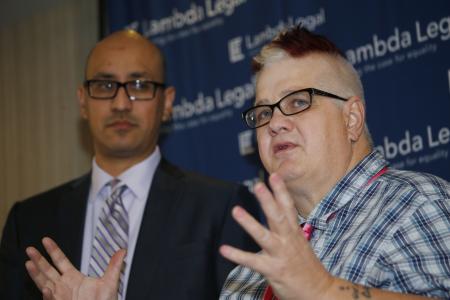
Intersex Activist Dana Zzyym Sues US State Department For ‘X’ Sex Demarcation On US Passports
by Heather Cassell
Denied a passport, Dana Zzyym, an intersex activist, is suing the United States State Department.
The Fort Collins, Colorado resident, who doesn’t identify as male or female, filed a lawsuit refusing to have to be forced to identify themselves by the gender markers currently available to applicants for US passports October 26.
Monday also was International Intersex and Transgender Awareness Day.
Dana, who is the associate director of the US affiliate of the Organization Intersex International, applied for a passport to attend the International Intersex Forum in Mexico City, Mexico in October 2014.
Dana’s application was denied and they weren’t able to attend the convention.
OII is a global organization advocating for the rights of intersex people, individuals who were born neither male nor female.
That’s when the trouble started.
The application only allows for individuals to identify their gender as “male” or “female,” which doesn’t match Dana or their birth certificate. Dana’s birth certificate lists their sex as “unknown.”
A first-time passport applicant Dana was forced to either leave the box blank or choose “male” or “female,” which would have been inaccurate. As a baby they underwent painful medical procedures and lived most of their life as a boy, but it never fit. They began learning more about being intersex when they got involved with IIO.
Instead, Dana wrote in “I,” when they preferred to place “X,” to correctly identify their biological sex on the application to match their birth certificate, which Dana had to submit with the application.
Australia, India, Nepal, and New Zealand use “X” to identifying gender variant individuals on passports.
“When I was a child, I had no say in what was done to me in order to make me,” says Dana, 50. “I am not male. I am not female. I am intersex. I shouldn’t have to choose a gender marker for my official US identity document that [doesn’t] fit me in some acceptable category.”
Paul D. Castillo, staff attorney at the South Central Regional Office of Lambda Legal in Dallas, which is representing Dana, agrees. The legal advocacy and litigation organization is representing Dana and accuses the state department of violating the Due Process and Equal protection clauses of the Constitution along with the Federal Administrative Procedure Act, according to media reports.
“Dana is intersex, identifies specifically as intersex and rejects categorically any effort by the federal government to compel them to choose one way or the other, says Paul.
The State Department in effect is demanding that Dana use incorrect information on the passport application and choose either ‘male’ or ‘female’ when, in fact, Dana is neither. They shouldn’t have to choose,” he adds.
Paul believes the US should utilize the mechanism by allowing for a third gender option, “X,” as his client wants to have offered, that is used by other countries and is growing in acceptance.
“It’s ironic when the government allows foreign nationals with “X” on their passport to enter and exit the United States but won’t for a US citizen,” Paul tells CBS Denver.
It’s estimated that 1.7% of the population is intersex, but some have chosen to identify as men or women, Paul tells The Guardian. It’s unclear how many people would use the “X” option if it was made available.
Dana, who is a US citizen and is a Navy veteran, would like themselves and any other US intersex person to have the same rights as any other person, reported Gay Star News.
“I defended the rights of this country. I believe I should be able to use a few of them,” Dana, who is a self-described air force brat, who was born in Michigan, tells The Guardian.
“I haven’t done anything wrong so why deny me?” Dana tells CBS Denver. “We exist. They’ve ignored us for 200 years in this country but have existed since the beginning of time.”
In 2010, the state department changed its passport policy allowing transgender people who have undergone sex reassignment surgery to legally change their gender on their passports with certification from a doctor. Temporary passports are also available for individuals going through gender transition.
Ashley Garrigus, a spokeswoman for the State Department’s Bureau of Consular Affairs, tells The Guardian that the department would not comment on pending litigation.
The state department has 60 days to respond to the complaint.
To book your next trip, contact Heather Cassell at Girls That Roam Travel at Travel Advisors of Los Gatos at 408-354-6531at or .
To contract an original article, purchase reprints or become a media partner, contact .







